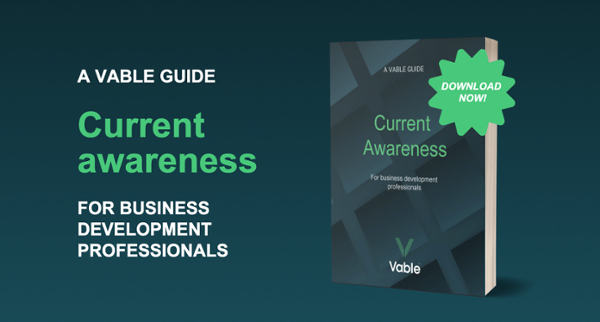Share this
Embracing innovation: Is your law firm at the forefront of technological advancement?
April 25, 2024

Digital transformation is happening now. How is your law firm changing to accommodate this transformation? Gone are the days when having a growing network of interdepartmental innovators was a rare find. Here I look at the role of the Chief Innovation Officer/Head of Innovation in driving change and shaping the future of legal services.
Discover how embracing innovative strategies, such as content curation and knowledge sharing, can turn digital disruption from a challenge into your greatest asset. Finally, I discuss why Vable’s current awareness self service solution could be your next evolutionary step on your innovation journey.
What is the role of the Chief Innovation Officer?
In a recent LawNext interview, the role was described as a "translator" or a "bridge" between the tech and the partnership/management committee. Often, these innovators will have been practising lawyers so they understand the everyday legal and business pressures. They listen, learn, and reflect on "what is missing" and how they can maximise "client impact".
As we all know, even if you ask people what they need or want, they might not know. The innovator role is about the "art of the possible", which requires extraordinary leaps in imagination. Once they have some compelling and interesting solutions, they can present them to the partnership. It's that visionary/practical mix which makes the role so interesting.
Seamless collaboration is a winner
It is essential for innovation teams to facilitate seamless collaboration and communication between law firms and clients if firms wish to remain competitive in an age of digital transformation. Although the innovator role varies from firm to firm, legal innovation expert Michele DeStefano identifies six key areas of responsibility:
- Curating ideas and facilitating innovation processes and execution
- Analysing technology available for lawyers that is or can be used by the firm to enhance transparency, increase access, create efficiencies, and please clients
- Analysing, unbundling, and reconfiguring processes to enhance transparency and to create efficiencies inside the firm to improve client service
- Aiding in new business pitches, responses to request for proposal (RFPs), and panel reviews
- Engaging with clients to better understand their needs, develop relationships, and collaborate to provide more client-centric, effective, and efficient services
- Networking with legal innovation communities across the globe
Facilitation, coordination, engagement, reconfiguration and other important concepts referenced in that list are underpinned by effective collaboration. And collaboration isn't just a perennial trend, it is a cultural and economic necessity, as Jen Dezso explains,
Collaboration is the most powerful driver of client institutionalization. According to Thomson Reuters’ research, clients who identify collaborative teams within an outside law firm spend an average of 56% of their wallet at that firm — more than twice the average share of spend received by the firms that clients use the most.
But let's look at how you can collaborate with your clients, and anticipate their needs.
How well can you anticipate your client's needs?
GenAI is everything; GenAI is disruptive. GenAI is evolving. Innovation teams are working out endless use cases for it. As mentioned in the interview above, firms are experimenting with ideas that will inform the future of the legal profession. They say the days of static/off the shelf tech solutions have evolved, and innovation teams want to continuously develop solutions after implementation.
After doing extensive research on "Show Me You Know Me", I was curious how you could use GenAI to anticipate and understand client needs, based on previous interactions, industry news, and other data. From the recent press and experts, it turns out that this is possible;
On the business development front, law firms have primarily focused on building relationships as a means of marketing themselves. This approach is still necessary, but no longer sufficient. Prospective clients now expect more than personal connections and want detailed information about deals, litigation track records, and other specific aspects of a firm’s experience. Bloomberg
And
The ability to tailor services to individual client needs has become a cornerstone of law firm success. Leveraging AI-generated insights empowers lawyers to understand clients at a granular level, and tailor communication to individual preferences. This sets the stage for a more client-centric lawyer-client relationship.
Generative AI’s predictive analytics further enhance a personalised approach by anticipating client needs through past interactions and case histories. This proactive strategy improves client satisfaction by addressing needs before they surface. It also demonstrates a heightened level of responsiveness. Thomson Reuters
And
The business of law - legal operations - is where ChatGPT and GenerativeAI can sing right now. I mean belt out an operatic or trashing metal vocal. This is where every law practice should be using GenAI. [I've given two examples]
-
Client sentiment analysis to analyze client feedback, reviews, and social media interactions to gauge client satisfaction and identify areas for improvement. This information can help law firms tailor their services, address specific concerns, and ultimately, enhance client relationships.
-
Tailored client pitches in crafting personalized and data-driven pitches for prospective clients. By analyzing a potential client's industry, legal needs, and preferences, AI can generate custom pitch materials that highlight the firm's strengths and expertise in addressing the client's specific requirements. Josh Kubicki
Legal professionals are concerned with doing the best they can for their clients and ensuring their business runs smoothly. Trend-spotting or horizon scanning isn’t necessarily at the top of their daily “to do” lists but if they want to grow the firm effectively, everyone - from trainee to managing partner - needs to anticipate future events.
Law firms need to put this “foresight” into practice so that they can be prepared to take their - and their clients’ - businesses into the future in a structured and efficient way. Everyone in the firm needs to be able to anticipate future trends to a certain degree, but especially teams involved in knowledge management, business intelligence, business development, innovation and strategy initiatives. So let's see where the tech goes!
Content delivery via portal, email or RSS feed?
Once your trusted advisors have selected which items to share with clients, content can be sorted into different topics or subject groups before being presented in a digestible and easily understandable format. This could be a simple email alert, via a self-service portal, or RSS feed on an intranet/webpage.
Self-service portal: Content aggregators like Vable have created collaborative and efficient ways of disseminating knowledge to clients and other end-users. Intuitive, easy-to-use, shared workspaces are increasingly popular.
Websites: Extranets, intranets, and client portals have been around for many years but the available technology means there is more functionality and transparency between client and advisor than ever before. RSS feeds can ensure a constantly updated stream of curated content.
Emails: Automated alerts and curated newsletters remain a popular way of maintaining client contact. These can be annotated with legal insights and added editorial for the benefit of readers. Regular communication can ensure you always stay in the mind of your (potential) clients and you might even open up a meaningful dialogue.
Social Sharing: How often do you read something and want to immediately share it with a friend, colleague or client? Identifying a relevant article amidst the noise and sharing it with someone - or on LinkedIn - can be a perfect way to make contact positively.
Why MyVable is perfect for your next evolutionary step
Vable’s customisable, self-service solution, MyVable, is a perfect example of technology that is “fit for purpose”. It has the potential to revolutionise information delivery, change mindsets by presenting relevant, accurate, and personalised information. You can also:
- Remove the fear of missing out on knowledge by having all your resources in one place
- Increase engagement and encourage best practice by bringing people together
- Choose what you want to see, including branding. Make MyVable Your Vable
- Share high-quality, targeted news and information with friends, clients and colleagues
It’s designed to be simple so you empower your end-users to subscribe themselves to a range of newsletters, as well as create personal alerts from available topics. MyVable allows law firms to deliver a bespoke information service to their own clients, answering calls for real innovation in the competitive legal world.
Share this
- February 2026 (1)
- January 2026 (2)
- December 2025 (2)
- November 2025 (2)
- October 2025 (3)
- September 2025 (2)
- August 2025 (2)
- July 2025 (4)
- June 2025 (3)
- May 2025 (2)
- April 2025 (1)
- March 2025 (1)
- October 2024 (1)
- July 2024 (1)
- June 2024 (2)
- May 2024 (2)
- April 2024 (3)
- March 2024 (3)
- February 2024 (4)
- January 2024 (2)
- December 2023 (1)
- November 2023 (2)
- October 2023 (2)
- September 2023 (1)
- August 2023 (3)
- July 2023 (5)
- June 2023 (2)
- May 2023 (2)
- April 2023 (4)
- March 2023 (1)
- February 2023 (1)
- January 2023 (2)
- November 2022 (2)
- September 2022 (2)
- August 2022 (2)
- July 2022 (1)
- June 2022 (1)
- May 2022 (2)
- April 2022 (3)
- March 2022 (1)
- February 2022 (2)
- December 2021 (2)
- November 2021 (2)
- October 2021 (2)
- September 2021 (2)
- August 2021 (2)
- July 2021 (2)
- June 2021 (2)
- May 2021 (1)
- April 2021 (2)
- March 2021 (1)
- February 2021 (3)
- January 2021 (2)
- November 2020 (3)
- October 2020 (1)
- August 2020 (2)
- July 2020 (4)
- June 2020 (1)
- May 2020 (1)
- April 2020 (2)
- March 2020 (2)
- February 2020 (3)
- January 2020 (1)
- December 2019 (2)
- November 2019 (1)
- October 2019 (1)
- September 2019 (1)
- August 2019 (3)
- July 2019 (3)
- June 2019 (3)
- May 2019 (2)
- April 2019 (1)
- March 2019 (2)
- February 2019 (3)
- January 2019 (3)
- December 2018 (1)
- November 2018 (2)
- October 2018 (2)
- September 2018 (1)
- August 2018 (2)
- July 2018 (1)
- June 2018 (2)
- May 2018 (3)
- April 2018 (3)
- March 2018 (1)
- February 2018 (3)
- January 2018 (1)
- November 2017 (1)
- October 2017 (1)
- July 2017 (1)
- April 2017 (2)
- March 2017 (3)
- February 2017 (1)
- January 2017 (1)
- November 2016 (2)
- October 2016 (1)
- September 2016 (1)
- August 2016 (2)
- June 2016 (1)
- May 2016 (1)
- April 2016 (1)


